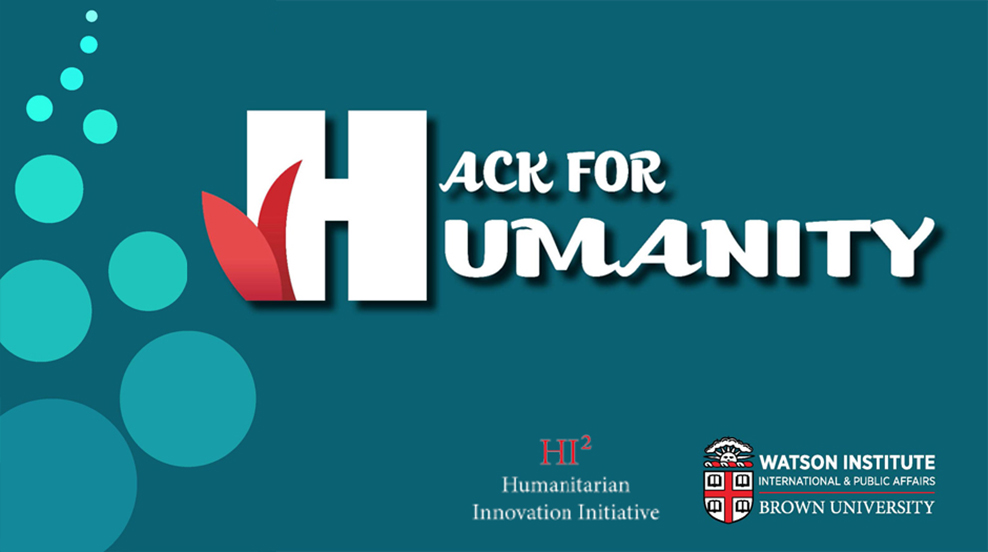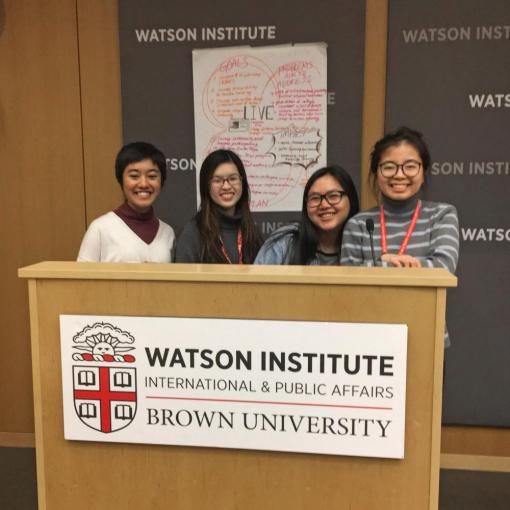 An inaugural Hack for Humanity was hosted by the Humanitarian Innovation Initiative at Brown University in mid-March. The humanitarian hackathon brought together students from across all disciplines and concentrations, forming 20 teams, to learn about the most pressing needs in the humanitarian sphere.
An inaugural Hack for Humanity was hosted by the Humanitarian Innovation Initiative at Brown University in mid-March. The humanitarian hackathon brought together students from across all disciplines and concentrations, forming 20 teams, to learn about the most pressing needs in the humanitarian sphere.
The teams developed creative ideas for innovative programs and technologies that could improve the lives of disaster and conflict-affected communities around the world.
.preview.jpg)
Engineering materials graduate student Truong Cai Sc.M. '18 and his team was awarded a $500 Brown Design Workshop Maker Grant for their JerryPot – Re-Designing the Jerry Can idea. Cai's team members included Subhanik Purkayastha '21 (public health), Emily Yamron '21 (public health) and Matthew Chen and Jing Zeng, both from the Rhode Island School of Design (RISD). The group designed a chamber pot to reduce water contamination at the household level, providing integrated storage for water and purification, and promoting local participation in water, sanitation and hygiene (WASH) efforts in future steps by incentivizing production, trade and use of soap.
Engineering and physics undergraduate Jennifer Bui '20 was a team member of Live: Community Radio Teacher Training System, which was awarded a $500 Nelson Center (l-r): Divya Rui-qi '20, Alyssa Pho '20, Xe Chang '20, and Jen Bui '20. Not pictured: Ashley Chen '20. for Entrepreneurship Explore Grant. Her teammates included Alyssa Pho '20 (health and human biology), I Divya Rui-qi '20 (anthropology and international relations), Ntxheb Chang '20 (development studies) and Ashley Chen '20 (computational biology). Their proposal included a collaboration with Children on the Edge and expanding their "train the trainer" strategy of training refugee members to be educators for the community. Live is a remote teacher training system that utilizes radios and visual aids for each educator that prioritizes community-based education and empowerment by decreasing barriers of access to teacher training.
(l-r): Divya Rui-qi '20, Alyssa Pho '20, Xe Chang '20, and Jen Bui '20. Not pictured: Ashley Chen '20. for Entrepreneurship Explore Grant. Her teammates included Alyssa Pho '20 (health and human biology), I Divya Rui-qi '20 (anthropology and international relations), Ntxheb Chang '20 (development studies) and Ashley Chen '20 (computational biology). Their proposal included a collaboration with Children on the Edge and expanding their "train the trainer" strategy of training refugee members to be educators for the community. Live is a remote teacher training system that utilizes radios and visual aids for each educator that prioritizes community-based education and empowerment by decreasing barriers of access to teacher training.
The Humanitarian Hackathon was held at the Watson Institute for International and Public Affairs and included 75 students from Brown, RISD and the Naval War College. The two-day hack covered five challenges to improve the lives of the disaster and conflict-affected Rohingya refugee community: Increasing access to community-based management of acute malnutrition programming, overcoming deliberate obstruction of humanitarian access, enhancing local participation in disaster risk reduction efforts, providing education opportunities for displaced children, and delivery of adequate WASH services in situations of severe population overcrowding. Each challenge had at least one designated mentor with extensive experience addressing the issues presented, as well as a facilitator with experience in hackathon pitching. Following final pitch presentations by each team, a panel of judges awarded three winning groups with grant funding to encourage continued engagement on the topic and further development of the winning pitches.
Director of the Brown Design Workshop and Engineering Senior Lecturer Chris Bull was one of five judges for the event.